When you take baclofen, you might wonder how long it’s really working - or when it’ll be completely out of your body. This isn’t just about when you feel the effects fade. It matters if you’re getting a drug test, planning surgery, switching medications, or worried about withdrawal. The answer isn’t simple, but it’s clear once you know the facts.
How long does baclofen stay in your system?
Baclofen has a half-life of about 2 to 4 hours. That means every 2 to 4 hours, your body removes half of what’s left. For most people, it takes around 10 to 20 hours for the drug to be mostly cleared from your bloodstream. But that doesn’t mean it’s gone from your system entirely.
Most of baclofen is eliminated through your kidneys in its original form - not broken down much by the liver. Because of this, people with kidney problems clear it much slower. In someone with healthy kidneys, 90% of a dose is gone within 24 hours. In someone with reduced kidney function, it can linger for days.
So while the active effects wear off in a few hours, traces of baclofen can still be detected in urine for up to 2 to 3 days after your last dose. Blood tests rarely test for baclofen unless it’s a forensic or hospital setting, but urine tests can pick it up for longer.
What affects how long baclofen stays in your body?
Not everyone clears baclofen at the same rate. Several factors change how fast or slow it leaves your system:
- Kidney function - This is the biggest factor. If your kidneys aren’t working well, baclofen builds up. People with chronic kidney disease may need lower doses or longer gaps between doses.
- Age - Older adults often have slower kidney function, so baclofen stays in their system longer. Dosing is usually reduced for people over 65.
- Dose and frequency - Taking higher doses or taking it multiple times a day means more drug accumulates. If you’ve been on baclofen for weeks or months, your body holds onto it longer than if you just took one pill.
- Hydration - Drinking enough water helps your kidneys flush it out faster. Dehydration slows clearance.
- Other medications - Drugs that affect kidney function, like NSAIDs (ibuprofen, naproxen) or certain blood pressure meds, can interfere with baclofen removal.
One real-world example: A 72-year-old man with mild kidney impairment took 20 mg of baclofen three times a day for spasticity. After stopping, it took him nearly 5 days to fully clear the drug - compared to a healthy 35-year-old who cleared it in under 24 hours.
Can baclofen be detected in drug tests?
Standard workplace or roadside drug tests don’t screen for baclofen. These tests look for illegal drugs like marijuana, cocaine, opioids, or amphetamines. Baclofen is a prescription muscle relaxant, not a controlled substance in most places, including Canada and the U.S.
But if a doctor orders a specific drug panel - say, after an overdose, accident, or unexplained drowsiness - baclofen can be detected in urine for up to 72 hours. In rare cases, like forensic toxicology after a fatal accident, labs can detect it even longer using advanced methods.
If you’re concerned about a drug test, don’t assume it’s invisible. If your job requires regular screening and you take baclofen, it’s smart to tell your employer or testing center ahead of time. Bring your prescription label. Most employers accept documented prescription use.
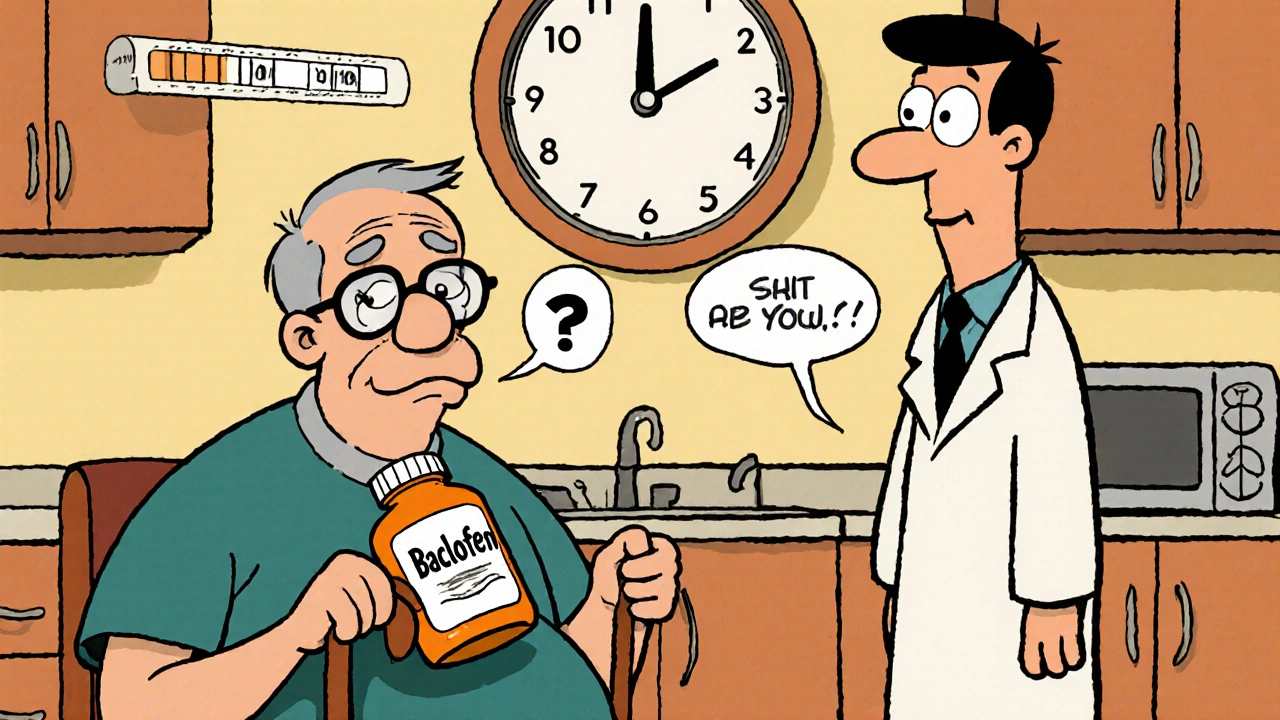
How does baclofen leave your body?
Baclofen doesn’t get broken down much by the liver. About 80% to 90% of it is excreted unchanged through your kidneys. That’s why kidney health is so important.
The rest - up to 20% - is metabolized into a few minor compounds, but none of these are active or toxic. They’re also cleared by the kidneys. No significant amount is removed through sweat, breath, or feces.
This makes baclofen different from other muscle relaxants like cyclobenzaprine or methocarbamol, which are heavily processed by the liver. If you have liver disease but healthy kidneys, baclofen is often safer than those alternatives.
What happens when you stop taking baclofen?
Stopping baclofen suddenly - especially after weeks or months of use - can cause serious withdrawal symptoms. This isn’t because the drug is still in your system. It’s because your nervous system has adapted to its presence.
Symptoms of withdrawal can start within 24 to 48 hours after the last dose and include:
- Hallucinations (seeing or hearing things that aren’t there)
- Seizures
- High blood pressure
- Increased muscle tone or spasms
- Agitation, anxiety, or insomnia
- Fever
These symptoms can be life-threatening. That’s why doctors never tell patients to quit baclofen cold turkey. Tapering down slowly - over days or weeks - is the only safe way to stop.
Even if the drug is mostly gone from your blood after 24 hours, your brain still needs time to readjust. Withdrawal isn’t about how long baclofen stays in your system - it’s about how long your body took to adapt to it.
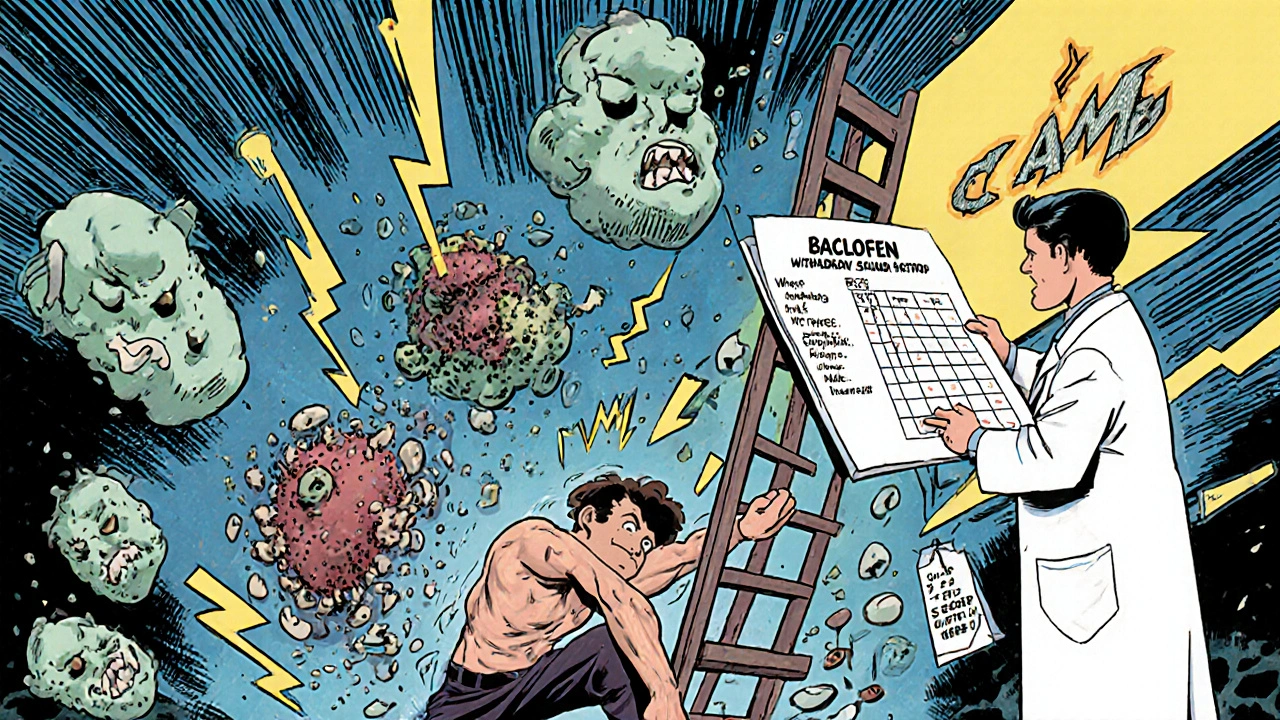
When should you talk to your doctor?
You should call your doctor if:
- You miss a dose and aren’t sure whether to take it late
- You’re planning surgery and need to stop baclofen
- You have kidney problems and are unsure about your dose
- You’re experiencing dizziness, confusion, or weakness that feels worse than normal
- You want to stop taking it - never do this on your own
If you’ve been on baclofen for more than a few weeks, your doctor will likely give you a tapering schedule. This might mean reducing your dose by 5 mg every 3 to 7 days, depending on your situation.
Some people take baclofen for years without issue. Others need to switch because of side effects or kidney changes. There’s no one-size-fits-all timeline. Your doctor knows your history - use that knowledge.
How to speed up clearance (and what won’t work)
There’s no proven way to make baclofen leave your body faster. Drinking extra water helps your kidneys work better - but only if they’re healthy. Diuretics (water pills) won’t help and can be dangerous.
Detox teas, activated charcoal, or sauna sessions? They don’t work. Baclofen isn’t stored in fat or processed by the liver, so these methods have no effect.
The only reliable way to clear it? Time - and healthy kidneys. Stay hydrated, avoid NSAIDs, and let your body do its job.
Bottom line
Baclofen is gone from your bloodstream within a day for most people. But it can show up in urine for up to 3 days. For those with kidney issues, it can linger much longer. The real risk isn’t detection - it’s withdrawal if you stop suddenly.
Always follow your doctor’s instructions. Never adjust your dose or quit without talking to them. If you’re worried about how long baclofen stays in your system, the best answer is always your medical team - not internet guesses.
How long does baclofen stay in your system for a drug test?
Baclofen is not screened in standard drug tests. If a specific test is ordered, it can be detected in urine for up to 2 to 3 days after the last dose. In people with kidney problems, detection may last longer - up to 5 days or more.
Can you speed up how fast baclofen leaves your body?
No. Baclofen is cleared by the kidneys, and there’s no supplement, drink, or method that reliably speeds this up. Staying hydrated helps if your kidneys are healthy, but diuretics, detoxes, or saunas won’t work. The only way is time and proper kidney function.
What happens if you stop baclofen suddenly?
Stopping baclofen abruptly can cause dangerous withdrawal symptoms, including seizures, hallucinations, high blood pressure, and severe muscle spasms. These can be life-threatening. Always taper off under medical supervision - never quit cold turkey.
Does baclofen show up on a workplace drug test?
No, standard workplace drug tests do not look for baclofen. It’s not a controlled substance and is not part of the typical 5- or 10-panel screens. However, if a test is specifically ordered for medical reasons, it can be detected.
How long does baclofen last in your body before you need another dose?
The effects of baclofen usually last 4 to 6 hours, which is why it’s often taken 3 to 4 times a day. Even though the drug is mostly cleared from your blood within 24 hours, the therapeutic effect wears off much sooner. Dosing schedules are based on symptom control, not just how long it stays in your system.

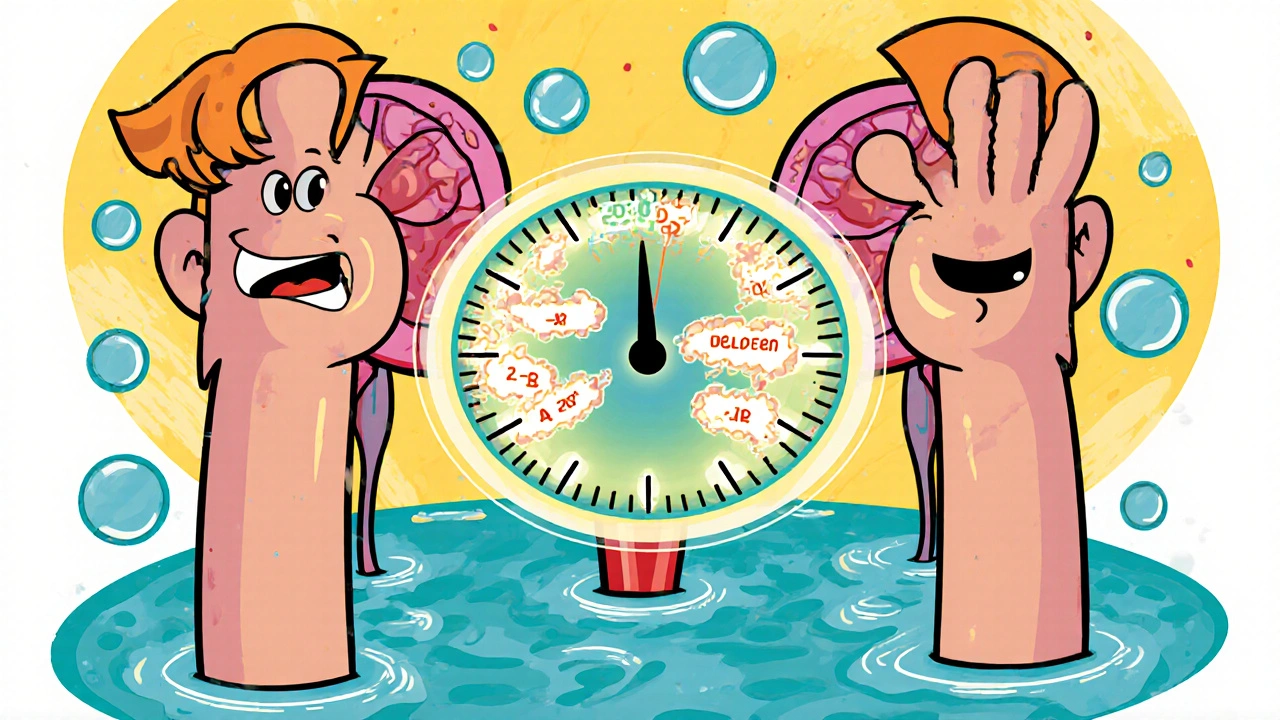
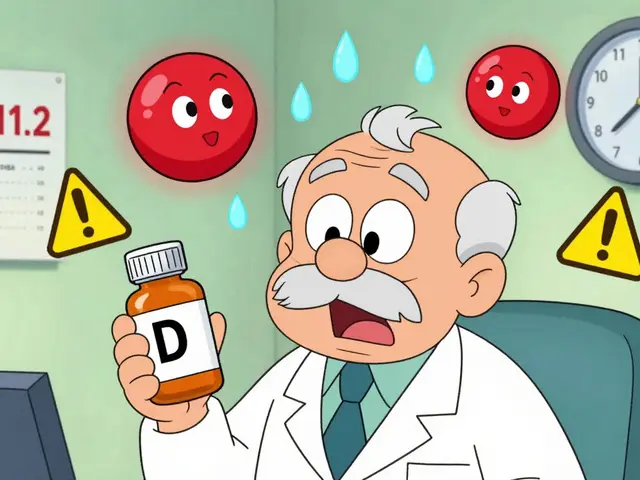

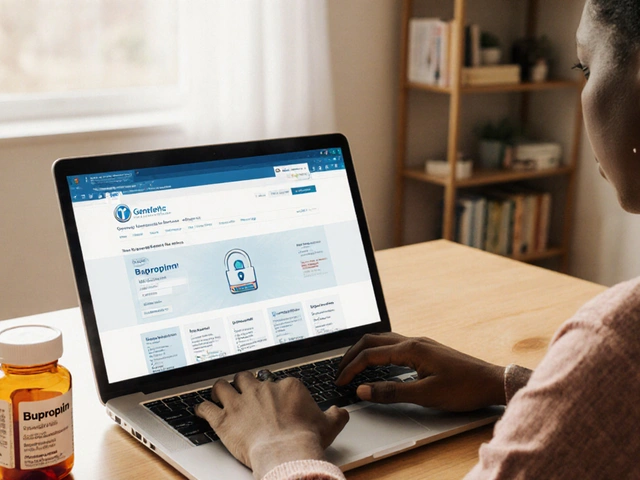
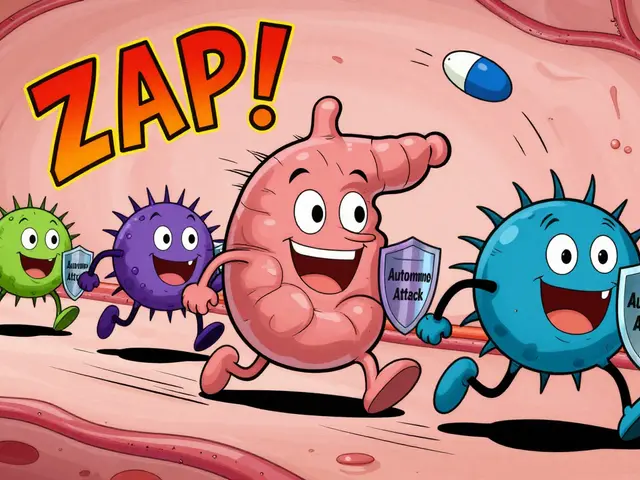
Brittney Lopez
October 31, 2025 AT 21:36Just wanted to say this post saved me so much stress-I’ve been on baclofen for spasticity after my MS flare-up and was terrified about the withdrawal stuff. I told my doc I was thinking of quitting cold turkey and he nearly had a heart attack. Tapering over 6 weeks was rough but way better than hallucinating at 3 a.m. Thanks for the clarity!
Jens Petersen
November 2, 2025 AT 09:36Oh please. Another ‘just drink water and pray’ post. The fact that you’re even entertaining the idea that hydration ‘helps’ is peak pseudoscience. Baclofen isn’t a toxin you can sweat out like a hangover-it’s a GABA-B agonist with renal excretion kinetics that require *actual* pharmacokinetic literacy. If you think a ‘detox tea’ does anything, you’re one tweet away from buying a crystal necklace to ‘balance your dopamine.’
Keerthi Kumar
November 4, 2025 AT 05:05Thank you for this deeply thoughtful breakdown-it reminds me of how my grandfather in Chennai, who took baclofen for post-stroke spasticity, was never warned about withdrawal. In India, many doctors still treat it like a simple painkiller. We need more awareness, not just about kidneys, but about the nervous system’s quiet adaptation. The body doesn’t forget; it waits. And when it wakes up… oh, it screams. Please, if you’re reading this: never rush the taper. Patience is the only medicine that doesn’t come in a bottle.
Dade Hughston
November 6, 2025 AT 01:02so i took baclofen for like 3 weeks after my car crash and then stopped because i felt like a zombie and now my wife says i have like weird twitching and i think its withdrawal but im not sure because i read online that its gone in 24 hours but also like i read something about kidney problems and now im scared to go to the doctor because i dont have insurance and also i think my neighbor is spying on me with his drone
Jim Peddle
November 7, 2025 AT 01:57Let’s be real. The FDA doesn’t screen for baclofen because it’s not profitable. Big Pharma doesn’t want you to know that a $2 generic can disrupt the opioid replacement market. The real danger isn’t withdrawal-it’s that your neurologist is being paid by the manufacturer to keep you on it. You think they care about your kidneys? They care about your refill rate.
S Love
November 8, 2025 AT 13:53This is an excellent, well-researched guide. For anyone reading this: if you’re prescribed baclofen, keep a log of your doses and symptoms. Communicate openly with your provider. If you’re tapering, track your progress weekly. And please-don’t self-diagnose withdrawal. Some symptoms overlap with anxiety, dehydration, or even sleep deprivation. Get professional guidance. Your nervous system deserves respect.
Pritesh Mehta
November 9, 2025 AT 08:36In America you worry about drug tests and kidneys but in India we worry about getting the medicine at all. Baclofen costs more than a month’s ration of rice in rural areas. We don’t have doctors to taper us-we have cousins with Google and WhatsApp groups. You think your 3-day detection window is scary? Try having no access to the drug at all and then your muscles lock up like rusted hinges. This isn’t a luxury, it’s survival. And you people argue about detox teas while we beg for pills.
Billy Tiger
November 10, 2025 AT 00:46Why are you even talking about urine tests baclofen isn't even illegal why are you acting like it's cocaine stop being paranoid and get a life